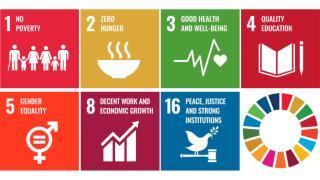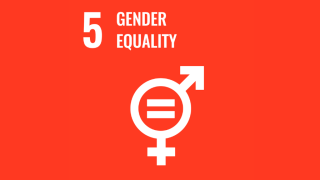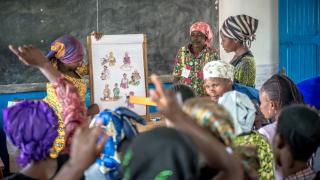Rishi Sunak’s not planning on attending the SDG Summit – what does this mean for women survivors of war?
Rishi Sunak’s not planning on attending the Sustainable Development Goals Summit
What does this mean for women survivors of war?
Next week, global leaders will be meeting for the Sustainable Development Goals (SDG) Summit - part of the annual United Nations General Assembly (UNGA) that takes place in New York. These high-level talks mark the halfway point to the 2030 deadline of achieving the SDGs – the world’s blueprint for a safer, fairer and more sustainable world.
Women for Women International is one of over 100 UK-based NGOs that have called on the UK Prime Minister, Rishi Sunak, to attend the SDG Summit and endorse the SDG Political Declaration. In a letter sent to the Prime Minister in August, UK aid and development leaders highlighted the UK’s central role in agreeing the UN Sustainable Development Goals (SDGs) in 2015 and called for a renewed effort from the UK Government to deliver on its commitment to the SDGs.
Regrettably, UK Government officials have since confirmed that the Prime Minister will not be attending the SDG Summit or the wider UN General Assembly in September, setting himself up to be the first UK Prime Minister in a decade to miss this important gathering. By not attending, Rishi Sunak will fail to affirm the UK Government’s commitment to the SDGs at a critical moment for the agenda.
Last year, the World Bank officially declared its longstanding goal of ending extreme poverty by 2030 unlikely. The Gates Foundation and Equal Measures 2030 estimated that the world won’t reach gender equality until at least 2108. And just last week, UN Women said that the world was “way off track” to meet the gender targets included in the SDGs, blaming a “lacklustre commitment” for this limited progress and claiming that an additional £290 billion a year would be needed to achieve gender equality by 2030. The call to #Act4SDGs has never been more urgent.
At Women for Women International, we know this only too well – and our own monitoring and evaluation data shows us that it is the most marginalised women survivors of war who are being left furthest behind.
This data highlights the realities for women before they enrol in our Stronger Women, Stronger Nations programme, and their progress at graduation one year later. Even with our holistic approach to programming, marginalised women living in conflict affected contexts continue to be disproportionately impacted by the compounding impacts of challenges such as conflict and insecurity, climate change, rising poverty and gender inequality.
When women enrol on our programme, we see the unlikely prospects of achieving the SDG’s reflected in their lived realities. For example:
- In the Democratic Republic of the Congo (DRC), where the climate crisis continues to impact farming, the number of women reporting that their household has enough food to eat when enrolling in our programme has not been above 17% for the last three years.
- We have seen similar trends in Rwanda where since 2020, less than 39% of women have reported having sufficient food at enrolment.
- We also see that, at enrolment, very few women can save a portion of their earnings, with less than 21% of women across Nigeria, South Sudan and the DRC, reported being able to save and build their resilience to economic shocks.
- Similarly, prior to engaging in our programme, women are largely excluded from family decision-making - with less than an average of 19% of women reporting being included in decisions on having more children across South Sudan, the DRC, Rwanda and Nigeria. And across all the contexts where we work, less than 26% of women feel able to discuss these issues with other women in their community, meaning that often the challenges they face are compounded by social isolation, exclusion and a lack of support.

But the picture isn’t entirely bleak. By situating our data in the framework of the SDGs and centring the experiences of the most marginalised women living in conflict-affected countries, we can demonstrate, year on year, just how impactful it can be to prioritise taking and sustaining a holistic approach to women’s power.
After graduating from our programme ,women’s ability to save increased in the DRC, South Sudan, and Nigeria to from an average of 21% at enrolment to 97% at graduation. Women’s access to decisions about having more children increased and the proportion of women building and sustaining community with each other skyrocketed to an average of above 60% across every context we work in.
As acknowledged by the Goals themselves, the lived experience of marginalisation or extreme poverty is multidimensional and interlinked – it is not defined by earnings alone. In that respect, our data reflects the complexity of leaving no one behind and how marginalisation affects the women we work with in every aspect of their lives. Building an enabling environment for women’s rights, especially in conflict settings, must be inclusive of every dimension of a woman’s experience, considering a range of issues – from food security and education to economic power and violence prevention.
Women are working to uphold their rights across the contexts we work in, but there is a danger that their realities will be missed at the SDG Summit next week. With time running out for the world to deliver the SDGs, this summit is more important than ever before. The Prime Minister’s presence at the Summit, along with other world leaders, is absolutely necessary to demonstrate the UK’s commitment to turning words into action and accelerating critical progress on the SDGs – especially for marginalised women affected by conflict.
Read more
Delivering The Global Goals 2022
subtitle:
By situating our data in the framework of the SDGs and centring the experiences of the most marginalised women living in conflict-affected countries, we can demonstrate, year on year, just how impactful it can be to prioritise taking and sustaining a holistic approach to women’s power. Explore our interactive data hub here.
The Global Goals
subtitle:
In 2015, world leaders agreed to 17 Global Goals to end poverty, fight inequality and stop climate change. We are concerned that marginalised women survivors of conflict are being failed by the Goals and are continuing to be left behind.
Where we work
subtitle:
Learn more about the conflict-affected countries where we work around the world. Since our origins in Bosnia and Herzegovina, we have expanded and adapted our programmes to support 579,287 women living in some of the world’s most challenging environments.



